人教版必修三第二单元语法:情态动词+have done和情态动词特殊用法
- 格式:doc
- 大小:37.50 KB
- 文档页数:4
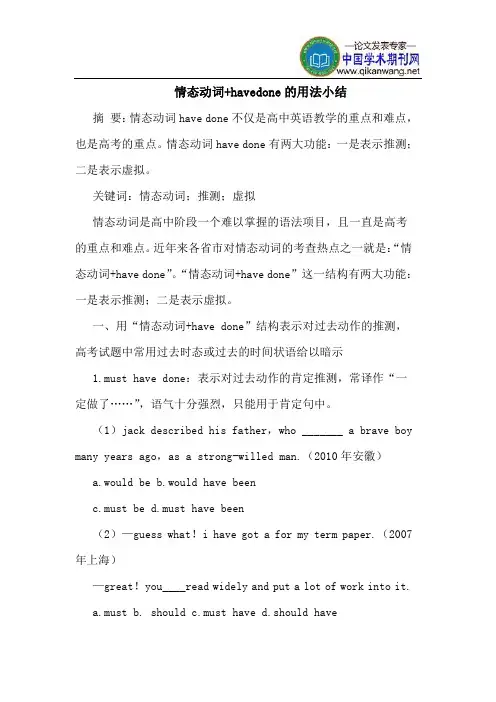
情态动词+havedone的用法小结摘要:情态动词have done不仅是高中英语教学的重点和难点,也是高考的重点。
情态动词have done有两大功能:一是表示推测;二是表示虚拟。
关键词:情态动词;推测;虚拟情态动词是高中阶段一个难以掌握的语法项目,且一直是高考的重点和难点。
近年来各省市对情态动词的考查热点之一就是:“情态动词+have done”。
“情态动词+have done”这一结构有两大功能:一是表示推测;二是表示虚拟。
一、用“情态动词+have done”结构表示对过去动作的推测,高考试题中常用过去时态或过去的时间状语给以暗示1.must have done:表示对过去动作的肯定推测,常译作“一定做了……”,语气十分强烈,只能用于肯定句中。
(1)jack described his father,who _______ a brave boy many years ago,as a strong-willed man.(2010年安徽)a.would beb.would have beenc.must bed.must have been(2)—guess what!i have got a for my term paper.(2007年上海)—great!you____read widely and put a lot of work into it.a.mustb. shouldc.must haved.should havekeys:d;c(注意:must have done只能表推测)2.may/might have done表示对过去的可能性推测“过去可能做了某事”,其程度小于must have done,一般也用于肯定句。
如:—i left my handbag on the train,but luckily someone gave it to the railway officials.—how unbelievable to get it back!i mean,someone _______ it.(2011年江苏)a.will have stolenb.might have stolenc.should have stolend.must have stolenkeys:b3.can/could (not)have done意思是“过去(不)可能做过某事”,常用于否定句和疑问句。
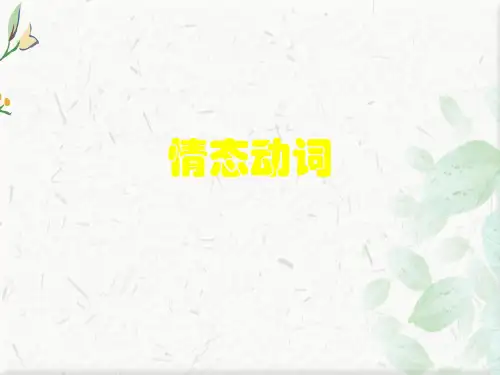
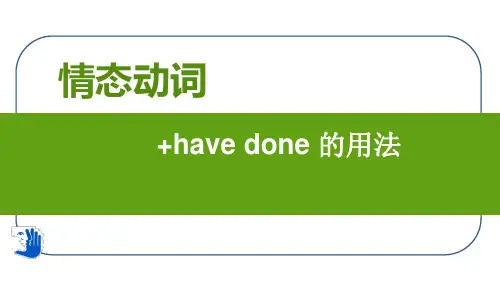
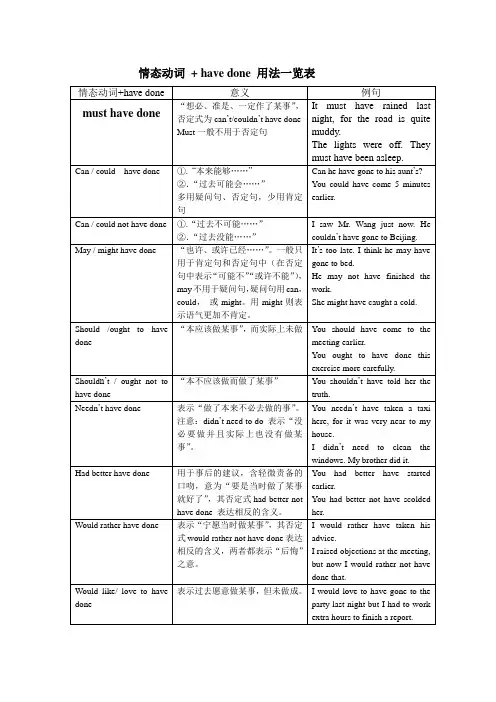

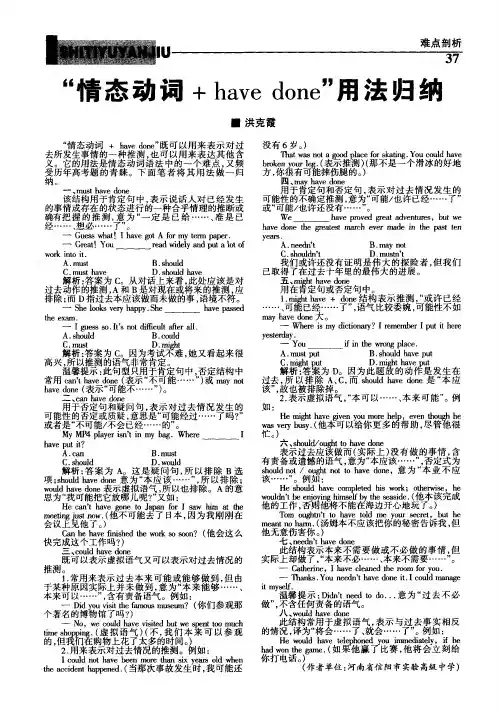
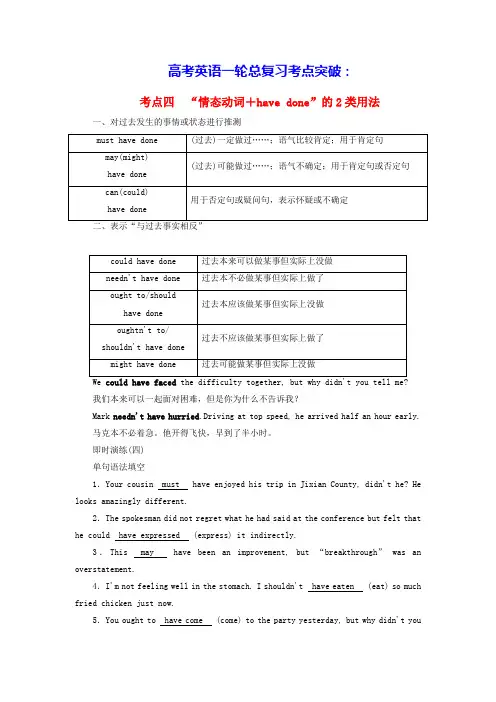
高考英语一轮总复习考点突破:
考点四“情态动词+have done”的2类用法
一、对过去发生的事情或状态进行推测
我们本来可以一起面对困难,但是你为什么不告诉我?
Mark needn't have hurried.Driving at top speed, he arrived half an hour early.
马克本不必着急。
他开得飞快,早到了半小时。
即时演练(四)
单句语法填空
1.Your cousin must have enjoyed his trip in Jixian County, didn't he? He looks amazingly different.
2.The spokesman did not regret what he had said at the conference but felt that he could have expressed (express) it indirectly.
3.This may have been an improvement, but “breakthrough” was an overstatement.
4.I'm not feeling well in the stomach. I shouldn't have eaten (eat) so much fried chicken just now.
5.You ought to have come (come) to the party yesterday, but why didn't you
come?。
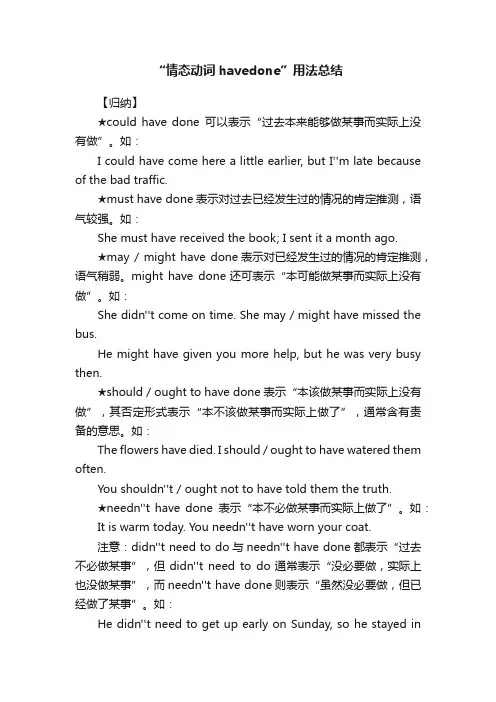
“情态动词havedone”用法总结【归纳】★could have done可以表示“过去本来能够做某事而实际上没有做”。
如:I could have come here a little earlier, but I''m late because of the bad traffic.★must have done表示对过去已经发生过的情况的肯定推测,语气较强。
如:She must have received the book; I sent it a month ago.★may / might have done表示对已经发生过的情况的肯定推测,语气稍弱。
might have done还可表示“本可能做某事而实际上没有做”。
如:She didn''t come on time. She may / might have missed the bus.He might have given you more help, but he was very busy then.★should / ought to have done表示“本该做某事而实际上没有做”,其否定形式表示“本不该做某事而实际上做了”,通常含有责备的意思。
如:The flowers have died. I should / ought to have watered them often.You shouldn''t / ought not to have told them the truth.★needn''t have done表示“本不必做某事而实际上做了”。
如:It is warm today. You needn''t have worn your coat.注意:didn''t need to do与needn''t have done都表示“过去不必做某事”,但didn''t need to do通常表示“没必要做,实际上也没做某事”,而needn''t have done则表示“虽然没必要做,但已经做了某事”。
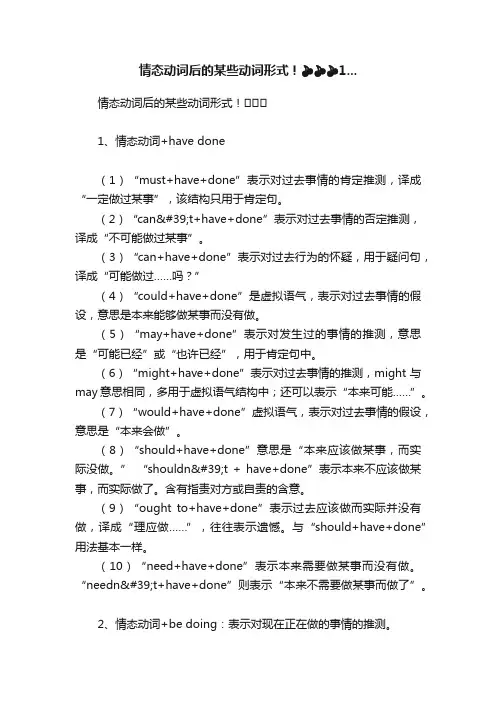
情态动词后的某些动词形式! 1...情态动词后的某些动词形式!1、情态动词+have done(1)“must+have+done”表示对过去事情的肯定推测,译成“一定做过某事”,该结构只用于肯定句。
(2)“can't+have+done”表示对过去事情的否定推测,译成“不可能做过某事”。
(3)“can+have+done”表示对过去行为的怀疑,用于疑问句,译成“可能做过……吗?”(4)“could+have+done”是虚拟语气,表示对过去事情的假设,意思是本来能够做某事而没有做。
(5)“may+have+done”表示对发生过的事情的推测,意思是“可能已经”或“也许已经”,用于肯定句中。
(6)“might+have+done”表示对过去事情的推测,might与may意思相同,多用于虚拟语气结构中;还可以表示“本来可能……”。
(7)“would+have+done”虚拟语气,表示对过去事情的假设,意思是“本来会做”。
(8)“should+have+done”意思是“本来应该做某事,而实际没做。
” “shouldn't + have+done”表示本来不应该做某事,而实际做了。
含有指责对方或自责的含意。
(9)“ought to+have+done”表示过去应该做而实际并没有做,译成“理应做……”,往往表示遗憾。
与“should+have+done”用法基本一样。
(10)“need+have+done”表示本来需要做某事而没有做。
“needn't+have+done”则表示“本来不需要做某事而做了”。
2、情态动词+be doing:表示对现在正在做的事情的推测。
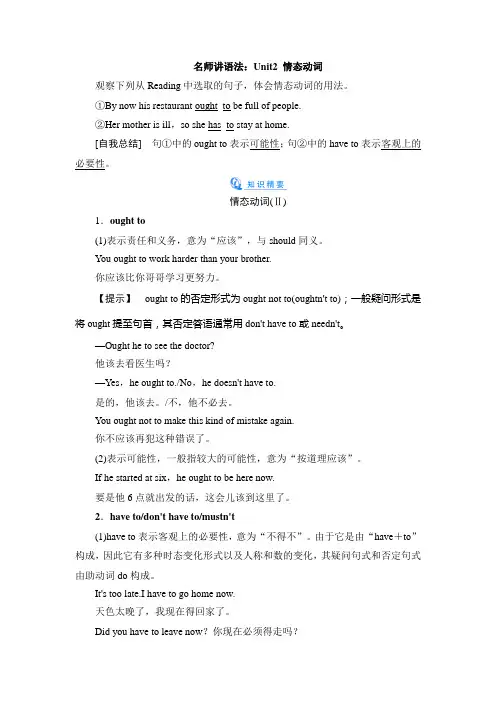
名师讲语法:Unit2 情态动词观察下列从Reading中选取的句子,体会情态动词的用法。
①By now his restaurant ought_to be full of people.②Her mother is ill,so she has_to stay at home.[自我总结]句①中的ought to表示可能性;句②中的have to表示客观上的必要性。
情态动词(Ⅱ)1.ought to(1)表示责任和义务,意为“应该”,与should同义。
You ought to work harder than your brother.你应该比你哥哥学习更努力。
【提示】ought to的否定形式为ought not to(oughtn't to);一般疑问形式是将ought提至句首,其否定答语通常用don't have to或needn't。
—Ought he to see the doctor?他该去看医生吗?—Yes,he ought to./No,he doesn't have to.是的,他该去。
/不,他不必去。
You ought not to make this kind of mistake again.你不应该再犯这种错误了。
(2)表示可能性,一般指较大的可能性,意为“按道理应该”。
If he started at six,he ought to be here now.要是他6点就出发的话,这会儿该到这里了。
2.have to/don't have to/mustn't(1)have to表示客观上的必要性,意为“不得不”。
由于它是由“have+to”构成,因此它有多种时态变化形式以及人称和数的变化,其疑问句式和否定句式由助动词do构成。
It's too late.I have to go home now.天色太晚了,我现在得回家了。
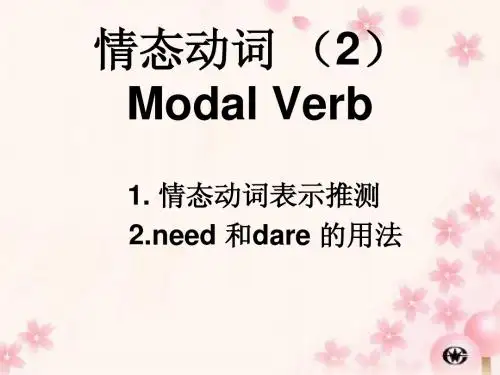
教学过程一、课堂导入先给学生一些比较简单的单选题或其他题型,让学生们自己思考,给出解答,让学生们先形成一种讨论的气氛,养成独立思考的习惯。
二、复习预习讲解上节课布置的作业与练习,以达到复习上节课知识点的目的;三、知识讲解知识点1:情态动词+have+done1【考查点】“must+have+done”表示对过去事情的肯定推测,译成“一定做过某事”,该结构只用于肯定句。
1. It must have rained last night, for the ground is wet.昨晚一定下雨了,因为地面还是湿的。
2. You must have been mad to speak to the servant.你和仆人说话,一定是发疯了。
2【考查点】“can't+have+done”表示对过去事情的否定推测,译成“不可能做过某事”。
1. Mr. Smith can't have gone to Beijing, for I saw him in the library just now.史密斯先生不可能去北京了,我刚才还在图书馆见过他。
2. Mary can't have stolen your money. She has gone home.玛丽不可能偷你的钱,她回家去了。
3【考查点】“can+have+done”表示对过去行为的怀疑,用于疑问句,译成“可能做过……吗?”。
1. There is no light in the room. Can they have gone out?屋里没有灯,他们可能出去了吗?2. There is nowhere to find them. Where can they have gone?到处找不到他们,他们可能到什么地方去呢?4“【考查点】could+have+done”是虚拟语气,表示对过去事情的假设,意思是本来能够做某事而没有做。
2021届高中英语新高考一轮语法复习讲义(三十八)情态动词+have done用法总结(含针对训练与解析)如:1)It must have rained last night ,for the ground is wet.2) You can't have forgotten it .3)I should/ought to have told you about it ,but I forgot.4)You needn't have waken me so early, for today is sunday.5)It's too late , she may have gone to bed.6)You had better have started earlier.7) I would rather have finished my article ahead of time.8)I would love to have visited you yesterday ,but I was too busy.真题演练用适当的情态动词填空。
1. I can’t find mypurse. I (leave)it in the supermarket yesterday, but I’m not sure.句意:我找不到钱包了!我可能昨天把它忘到超市里了,不过我不确定。
2. I have worried before I came to the new school, for my classmates here are very friendly tome.3.—Sorry, Mum! I failed the job interview again.—Oh, it’s toobad. You have made full preparations. 4. My book, The House of Hades, is missing. Who have taken it?句意:我的书《哈迪斯之屋》丢了。
2021届新高考英语语法微专题培优复习情态动词与have done知识点总结与练习(含解析)情态动词在高考题中的考察非常直接,主要考察以下两方面:1、情态动词的本义2、情态动词与have done咱们今天先把简单的解决了,就是情态动词与have done。
这东西在考试里就俩方向,一个表示对过去的推测,一个表示对过去的虚拟。
注意,只要情态动词加了have done,一定表示“过去”的事。
1、表示对过去情况的推测must have done / can't have donecould have done / couldn't have donemight (may) have done / might (may) not have done三者的语气按照must — could — might的顺序依次递减,表示对于推测准确性的把握在逐步降低。
当然,在题目当中我们并不需要掌握三种语气的差异,只要观察题目中有没有出现推测的证据,或者证据是否确凿,即可作出语气强或弱的判断。
有证据,就强;没证据,就弱。
2、表示对过去情况的虚拟should have done本应该责备语气shouldn't have done本不应该责备语气could have done本可能遗憾/惋惜语气couldn't have done本不可能意外/惊喜语气needn't have done本不必多余/不必要语气表示虚拟时,句中一定可以加入“本来……”这样的口吻。
请注意,每种虚拟都有自己的使用场合,进而传达出在该场合下需要体现的语气和态度。
把两方面合并在一起,我们就会发现,情态动词+have done的结构,其实可以这样来方便记忆:must / might (may) 推测+could 推测/虚拟+should / need 虚拟must和might肯定是推测,should和need肯定是虚拟,只有could一个同时身兼两种功能,所以遇到的时候要注意判断。
高中英语必修三考点一情态动词(unit 1 ,unit 2)一、情态动词的特点:1.没有人称和数的变化。
2. 有些情态动词有过去式的变化:e.g. will → would , can → could , may→ might ,dare → dared二、情态动词的否定式:情态动词+ not +动词原形can not: can't , must not: mustn't , need not : needn't三、情态动词的用法及相互区别, 是考试的内容之一1. can , be able to be able to 表示经过努力后, 能够做到; be able to 有多种形式的变化。
can1). 表示体力或脑力方面的能力;2). 表示允许、可能性。
could 是can的过去式, 表示过去有能力及过去存在的可能性; 用于疑问句表示委婉地提出问题。
1) The fire spread through the hotel very quickly but everyone ____ get out. (NMET 97 )A. had toB. wouldC. couldD. was able to2) -Will you stay for lunch?-Sorry, __. My brother is coming to see me. (NMET99)A. I mustn'tB. I can'tC. I needn'tD. I won't2.may 表示询问或说明一件事可不可做; 表示某事有可能发生。
might是may的过去式; 用在疑问中比may委婉、客气。
1) -May I take this book out of the reading-room?-No, you mustn't. ( Yes, you may.)2) -Might I make a suggestion? -Yes, you may.3. must1). 表示必须要做的事: 必须2) 表示很有把握的推断: 一定, 准是。
情态动词+havedone的⽤法⼩结
情态动词+havedone的⽤法⼩结
摘要:情态动词have done不仅是⾼中英语教学的重点和难点,也是⾼考的重点。
情态动词have done有两⼤功能:⼀是表⽰推测;⼆是表⽰虚拟。
关键词:情态动词;推测;虚拟
情态动词是⾼中阶段⼀个难以掌握的语法项⽬,且⼀直是⾼考的重点和难点。
近年来各省市对情态动词的考查热点之⼀就是:“情态动词+have done”。
“情态动词+have done”这⼀结构有两⼤功能:⼀是表⽰推测;⼆是表⽰虚拟。
⼀、⽤“情态动词+have done”结构表⽰对过去动作的推测,⾼考试题中常⽤过去时态或过去的时间状语给以暗⽰
1.must have done:表⽰对过去动作的肯定推测,常译作“⼀定做了……”,语⽓⼗分强烈,只能⽤于肯定句中。
(1)jack described his father,who _______ a brave boy many years ago,as a strong-willed man.(2010年安徽)
a.would be
b.would have been
c.must be
d.must have been
(2)—guess what!i have got a for my term paper.(2007年上海)
—great!you____read widely and put a lot of work into it.
a.must
b. should
c.must have
d.should have。
Book 3 Unit 2 Healthy eating
(一)情态动词+have done用法:
1.must have done
“过去一定发生了/做了某事”,表示对过去事情肯定推测,只用于肯定句中。
It must have rained last night,for the road is quite muddy.
昨晚一定下雨了,因为路很泥泞。
2.can/can’t have done
“过去可能发生了(做了)某事/过去不可能发生了(做了)某事”,表示对过去疑问和否定的推测,用于疑问句和否定句中。
There is nowhere to find Tom. Where can he have gone? He can’t have gone to Beijing, for I saw him just now.
到处都找不到汤姆,他可能去哪里呢?他不可能去北京,我刚刚还见他来。
3.couldn’t have done
“过去不可能做过某事”
1)表示对过去事情的否定推测
We couldn’t have heard them because of the noise from the river.
由于河水的声音我们当时不可能听到他们的谈话。
2)用于虚拟语气
If it hadn’t been for your help, I couldn’t have succeeded.
要是没有你的帮助,我也不可能成功。
4.could have done
“过去本来能做某事而实际上没做”(表虚拟)
Tom could have passed the exam, but he was too careless.
汤姆本来能通过考试,但他太粗心了。
5.may/might have done
“过去可能/也许做了某事”表示对过去发生过的事情的推测,用might 可能性更小。
It is too late. I think Tom may /might have gone to bed.
太晚了,我想汤姆或许已经睡了。
6.may not /might not have done
“过去可能/也许没做过某事”表示对过去发生过的事情推测,用might 可能性更小。
Tom may not have finished his homework.
汤姆可能没完成他的作业。
They might not have regarded me as their friends.
他们可能没把我当朋友看待。
7.should/ought to have done
“过去本应该做某事而实际上没做”
You are too lazy. You should/ought to have finished the work yesterday. 你太懒了,你昨天本应该完成那项工作。
8.shouldn’t /oughtn’t have done
“过去本不应该做某事而实际上却做了”You shouldn’t/oughtn’t have told her the truth. 你本不该告诉她真相。
9.needn’t have done
“过去本来不必做某事但却做了”
You needn’t have taken a taxi here.
你本来不必打车来这里。
(二)情态动词的特殊用法
1. can’t but do sth表示“不得不/只好做某事”
I can’t but tell you the truth.
我不得不告诉你真相。
注意:表示“不得不/只好做某事”的句式:can’t help but do
can’t choose but do
can do nothing but do
2.can’t help doing sth 情不自禁做某事Hearing the sad story, he can’t help crying.
听完那个悲伤的故事, 他禁不住哭了起来。
3.may as well do sth 最好/倒不如做某事
You may as well finish your work now.
你最好现在就完成你的工作。
4.may well do sth 相当于be likely to do sth
“很可能做某事”
Tickets are likely to be expensive.
入场券可能很贵。
5.can not /can never +be +adj enough,
can not /can never +be +too adj
“再...也不过分”或“越..越好”
You can never be too careful while crossing the road.
You can never be careful enough while crossing the road.
过马路的时候,你越细心越好。
6.may用于祈使句,表示祝愿
May you succeed!
祝你成功!
7.must 表示“偏要,硬要”
Must you make so much noise?
你非要这么吵吗?
8.should与疑问词连用,表示说话人惊讶、难以相信等。
How should I know?
我怎么知道呢?
Why should he think that ?
他怎么那么想呢?。